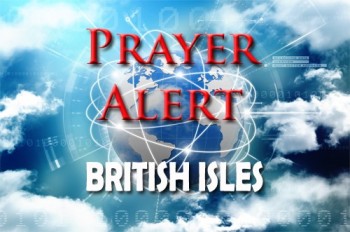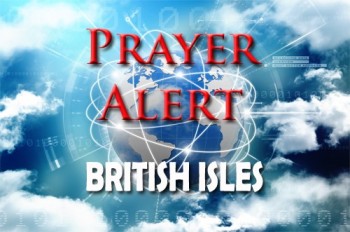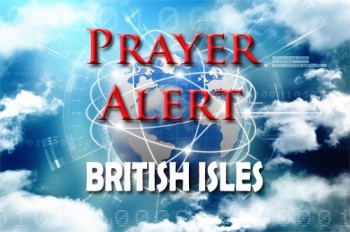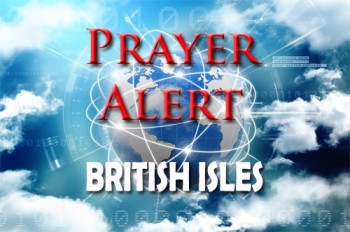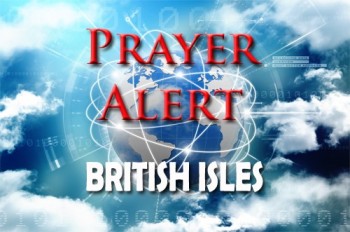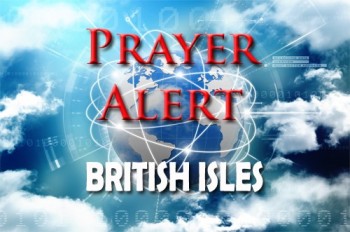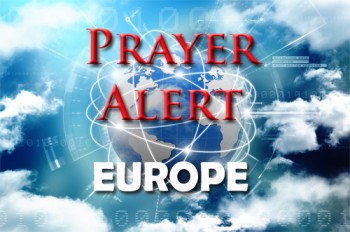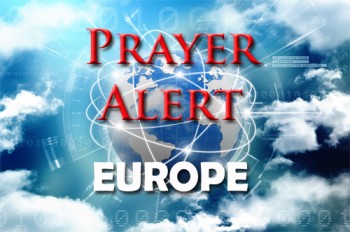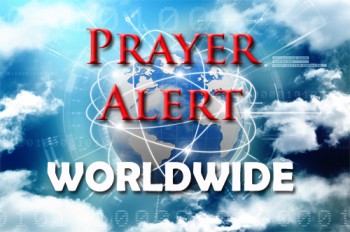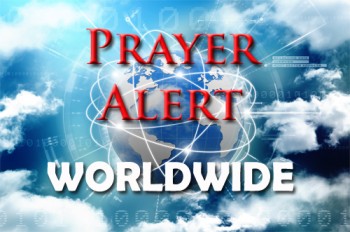
David Fletcher
David Fletcher is Prayer Alert’s Editor.
He is part of a voluntary team who research, proof-read and publish Prayer Alert each week.
If you would like to make a donation towards our running costs, please click here.
Evangelism will be the ‘clear theme’ of the CofE General Synod, which meets from 20 to 23 February. A new evangelism report states that ‘focused efforts will be needed to multiply and replicate confident disciples who are equipped and released to live out their faith in the whole of their lives’. The report quotes Dr Michael Jinkins, of Louisville Presbyterian Theological Seminary, on baptism: ‘We are soaked to the skin in the death of Christ. We trail wet footprints of the drenching wherever we go.’ It concludes, ‘We need to prioritise how we help people drip their wet footprints into the people and places of their lives, spreading the aroma of the knowledge of Christ everywhere.’ There is an aim to fulfil the vision to motivate and enable worshippers to move from church attendees to advocates and apprentices who are outward-looking and confident in their faith and church.
Birmingham Mail recently reported clashes between parents and Parkfield Community School over a pilot curriculum challenging homophobia in primary schools. The deputy head of Parkfield, Andrew Moffat, who is openly gay, created the programme. The parents’ objection was not his sexuality, but the curriculum, called ‘No Outsiders’. They feel it goes against their religious beliefs regarding homosexual relationships. The school is mainly attended by Muslim children. Moffat has a lot of support in local government, and was given an MBE for services to education equality and diversity. Tristan Chatfield, the cabinet member for social inclusion, has suggested the parents are simply misinformed about what the school is trying to do. On 7 February dozens of parents gathered outside the school gates to object to transsexualism being taught to primary-age children. See
Fracking company Cuadrilla has requested an urgent review of existing earthquake safety levels, hoping that the permission to generate larger tremors will allow them to extract greater quantities of shale gas from Lancashire. Currently they must suspend drilling when quakes measuring over 0.5 magnitude are detected. Although numerous legal challenges and protests were not enough to prevent the company from beginning exploratory drilling at Preston last year, it is now the government’s ‘traffic light system’ for seismic activity which the industry appears to consider the greatest threat to its survival. There is a ‘rich reservoir of recoverable high quality natural gas present’, but the seismic operating limit remains a barrier to developing its potential. David Attenborough and others believe that the Government should stop wasting time on this polluting industry and back the clean energy infrastructure needed to tackle climate change.
We hear doomsday predictions for what life after Brexit could look like. Pray for God to replace fear and confusion with appropriate preparations for the March deadline. Currently people must show their passports when crossing into or out of the UK, but commercial goods do not need to be checked if they are going to or coming from the EU. Britain needs to secure a free trade agreement with Brussels so that there is no need to harden and slow down the current border set-up, particularly between the Republic of Ireland and Northern Ireland. Pray for Arlene Foster, whose ten MPs prop up Theresa May's minority government. Ask God to help negotiators to replace the current backstop with a workable solution. May the Brexit brains in the Government have imaginative and flexible thinking to work out a unique solution. See also Europe article 1.
Wycliffe Associates is advancing Bible translation and has received requests to launch 619 translation projects worldwide, including groups in DRC, Indonesia, Papua New Guinea, and Nigeria. ‘When they hear that the entire New Testament can now be translated in just months through ground-breaking technology, they are astonished, and they plead for a chance,’ said Wycliffe’s CEO. Traditionally, translations of the New Testament into another language have taken as long as 25 to 30 years. Pray for God's protection over Bible translation workshops for mother-tongue speakers, and for adequate funding for technology resources. Pray for God to keep translators safe when working discreetly in places where Christians face intense persecution. To date, the organisation has installed 90 print-on-demand units in 31 countries. By God’s grace they have distributed 5,485 tablets in 67 countries so far.
The Science and Technology Committee has decided to monitor reporting of clinical trials by universities, and will question those that don’t improve. Clinical trials are the best way to test whether a medicine is safe and effective. They can involve thousands of people, patients and healthy volunteers, and take years to complete. Results from around half of all clinical trials remain hidden. Trials with negative results are twice as likely to remain unreported as those with positive results. This means that people who make decisions about medicines do not have full information about the benefits and risks of treatments we use every day and can dramatically alter how a drug is perceived, leading to unnecessary spending in the NHS. See
On 7 February, following a ‘robust but constructive’ meeting between Jean-Claude Juncker and Theresa May, who was seeking changes to her Brexit deal, Mr Juncker stressed that the withdrawal agreement would not be redrawn, but he held open the possibility of adding ‘more ambitious’ wording to set out plans for the future relationship. Despite the challenges, the two leaders agreed that their teams should hold talks as to whether a way through can be found that would gain the broadest possible support in the UK parliament and respect the guidelines agreed by the European Council.
The US decision to remove 2,000 troops from Syria worries France, which has 200 special forces in areas wrested from IS by the Syrian Democratic Forces (SDF). US forces ferried supplies to French commandos, and helped evacuate French wounded. But the great dilemma is what to do with the 130 French jihadists held by the SDF (along with 770 from other countries). The SDF complains of the burden of guarding so many foreign jihadists, and wants France to repatriate its 130 nationals. The numbers could swell. Another 250 French jihadists are held in Iraq. Many of the detainees are women and children deeply implicated in terrorism. The French prison systems cannot cope with a massive influx of returning jihadists. And if they are tried, it could be difficult to find evidence against them. There are already 150 returnees in the prisons, with thirty due to be freed this year. French intelligence has repeatedly been unable to prevent terrorists on watchlists from staging attacks.
Rev Mathew Sukada, from Jos, has cautioned Nigerians, ‘Do not kill yourselves over politicians; they do not even know you and will reconcile with each other long after you are gone’. He said some politicians were more concerned about their personal interests, and cautioned youths against being used as thugs to kill and destroy. ‘Politicians seeking to use you for selfish reasons will offer you peanuts to fight and kill for them. When you get killed, they won’t remember you. When you get injured, they won’t have time for you. When you are caught, they will deny you. You must learn to be wise and protect yourselves against destruction. As Christians, you have a duty to serve only God, your Creator.’ An army commander told troops, ‘Let me warn and remind you of the need to remain apolitical in the performance of your duties during the election period. Defaulters will be severely dealt with. You must be professional, patriotic and respectful of the rights of citizens.’ See
An estimated 180,000 people attended mass with the Pope in Abu Dhabi, the capital of the United Arab Emirates, close to the birthplace of Islam. The crowds gathered to hear him just a day after he called on Christians and Muslim leaders to work together in the rejection of war. He spoke about how Christians should live, pointing out that Jesus came to serve and not be served. He went on to say Jesus lived in poverty in respect to things, but displayed wealth in love. He healed so many lives, but did not spare his own. In his speech to an audience consisting of Abu Dhabi's crown prince, hundreds of imams, muftis, ministers, and rabbis, the Pope warned that the future of humanity was at stake unless religions come together to resist the ‘logic of armed power.’ ‘We will either build the future together, or there will not be a future. God is with those who seek peace.’

